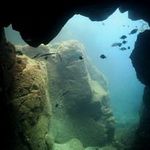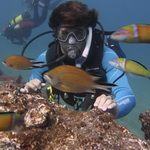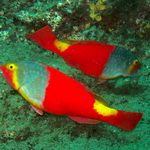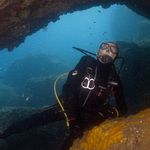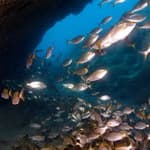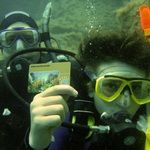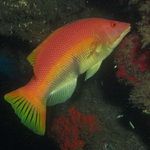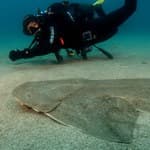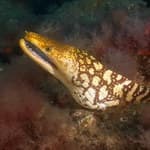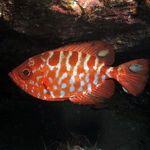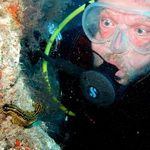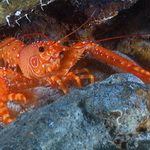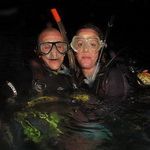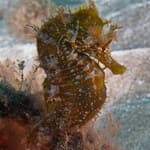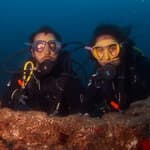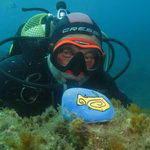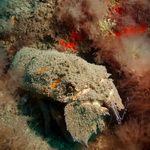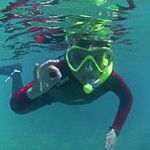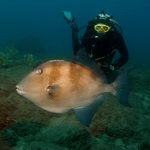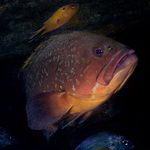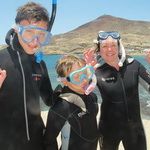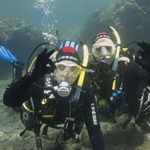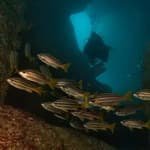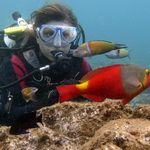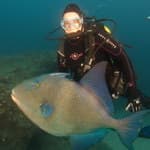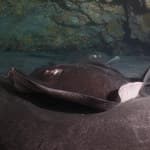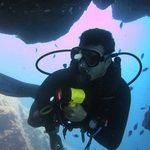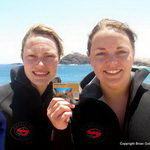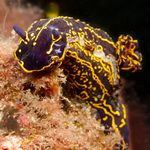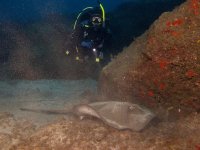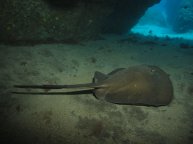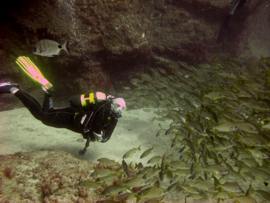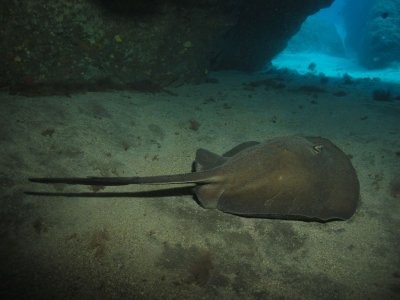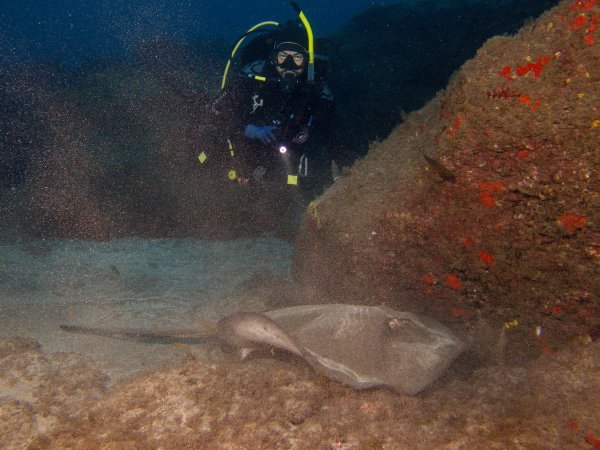Diving with Angel Sharks in Gran Canaria
We get asked all the time by visitors if there are any sharks in Gran Canaria. Most want to know if it is safe to swim in Gran Canaria, while some want to know if they can dive or snorkel with these beautiful animals.
Nobody has ever been killed by a shark in Gran Canaria (or as far as I know the Canary Islands), and although a tiny number of people in the Canaries have been injured by sharks in the last 20 years, none of the injuries were life-threatening or life-changing. Millions of people swim safely in the sea of the Canaries every year without problem
Angel sharks are among the most placid, docile and non-aggressive sharks anywhere in the world. Their common name gives it away .. Angel Sharks ..mainly named because of the shape of the body when seen from above.
So just how 'shark infested' is the water around Gran Canaria? Is it safe to paddle in the sea in Gran Canaria? Is it safe to swim in Gran Canaria? Is it safe to go in the water with a cut or open wound on your leg?
The answer is that YES, the waters are SAFE!. Our small population of endangered residents angel sharks rarely come into shallow water and avoid human contact. Attacks by sharks across the Canaries are extremely rare (less than one every 15 years) and never fatal or life changing, and you have no need to be worried by their presence in deeper waters.
Unfortunately, over the years, films and documentaries have built up a black reputation for sharks in general, yet most holiday accidents involve a slip and fall at their poolside, injuries while drunk or have a heart attack on the beach. Statistically you are less safe in all these places than in the sea. This 'highly dangerous' reputation is very different from the real profile of the common shark in the Canaries, the Angel Sharks (Squatina squatina), for the following reasons:
- Angel Sharks are bottom dwellers, who rarely swim near to the surface, and are rarely seen by swimmers or snorkellers.
- Angel Sharks are bottom feeders and they only have a very small mouth.
- Angel Sharks are selective predators who prefer just one type of fish - sardines, so they have no interest in us as a dietary supplement.
- Angel Sharks are small and scared of us. The average size is about 1.2 meters long, but when compared to divers or swimmers, we pose more of a threat to them and so they hide or flee.
- Angel Sharks are critically endangered and listed on the IUCN 'Red List' of endangered species. They can be found if you know where to look, and probably number only 3-4 per square kilometer.
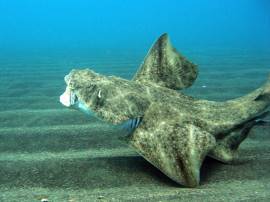
Our diving centre has been diving with Angel Sharks for nearly twenty years, and for the last couple of years our experts have been pooling our observations with the University of Las Palmas. During that time we have had hundreds, if not thousands, of sightings of Angel Sharks. Our instructors dive with them when they are swimming; we find them stationary; and we dive with them at night!
In all these years we have never had a contact where anyone has had an unprovoked attack by angel shark. On a couple of occasions they have been annoyed by our presence, and made themselves look aggressive, but apart from a few warning 'feints', and two or three bumps, we have only had one actual 'bite' underwater by an angel shark! This was when our instructor was pointing out the location of shark in the sand, it mistook his finger for food and sampled it. The wound was similar to that imposed by a dog bite, but he still has all his fingers!.
So you can come diving with sharks without fear, as none of our guests has had a problem with these beautiful creatures, and we will happily use our hands and fingers to point them out to you.
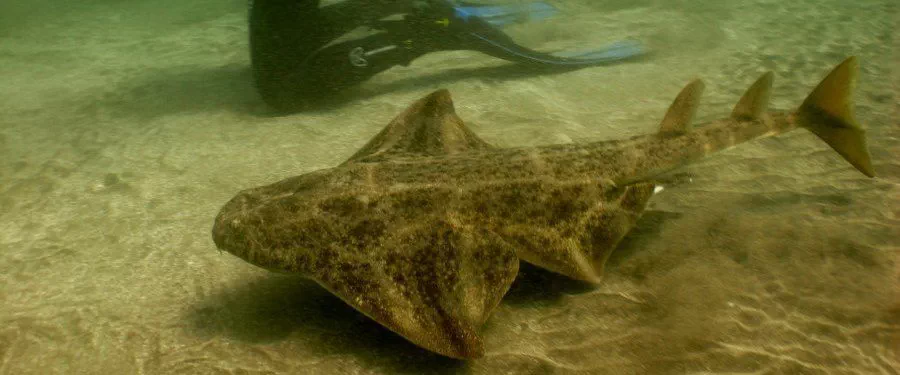
There are also rare sightings by divers with two other sharks, hammerheads and blue sharks. These are however deep water species and rarely stray into shallow water. If you go deep sea fishing, or boating several miles off shore you may if you are lucky encounter these over the deep water trenches that surround Gran Canaria.
One of the very few verified encounters with other sharks was on Christmas Day, 2015, a
Spanish lady was bitten by what was judged to be a deep water Silky shark while swimming,
just before dusk, when there appeared to be some dead fish floating on the surface. The UK
press, starved of good stories at Christmas, over-reacted and did their best to blow the
incident into a major issue with headlines like 'Tourist bitten by Shark'. The Spanish lady,
who is a Doctor, was shaken and cut on the arm, but did not suffer any life-changing or
life-threatening injury Nothing like this has been recorded before, or since. We can't
even find the Silky shark, thousands of people bathe safely off the shore of Gran Canaria
every day of the year, and we dive in the same spot on a regular basis without seeing
this shark.
Our Recommendation is therefore if you are still worried, do not bathe at dawn or dusk in
winter or if there are dead fish floating on the surface.
Sharks are certainly misunderstood and create apprehension and fear in a great many people. To make those of you who are afraid feel a little bit better, here is a world-wide list of things are much more likely to kill you than sharks!
- Heart Disease – Kills 7.25 million people annually
- Mosquitoes – Kill 1.4 million people annually
- Cars – Kill 1.21 million people annually
- Lightning – Kills 24,000 people annually
- Boats – Kill 5900 people annually
- Texting – Kills 5870 people annually
- Drowning – Kills 2000 people annually
- Bees, Wasps and Hornets – Kill 1280 people annually
- Ants – Kill 980 people annually
- Dogs – Kill 455 people annually
- Snakes – Kill 160 people annually
- Spiders – Kill 120 people annually
- Vending Machines – Kill 65 people annually
- Hippos – Kill 50 people annually
- Jellyfish – Kill at least 40 people annually
- Crocodiles and Alligators – Kill 14 people annually
- Scorpions – Kill 10 people annually
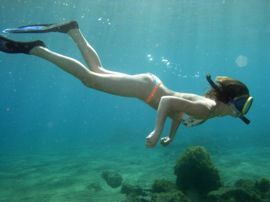
So yes, it is safe to bathe on the beautiful Canarian beaches without any fears of being dragged under by any ferocious carnivore. And you can jump into the sea from your pirate cruise or snorkeling trip, safe in the knowledge that any angel sharks or even silky and hammerhead sharks in the area are probably moving away from you, or hiding absolutely still ten or more meters underneath the boat, waiting for you to leave. And you can ignore the video of 'Shark Diving in Fuertaventura' which shows some Guitar Sharks .. these are not native and I think that the footage was taken in a controlled environment not the open sea. As for the attack in Arinaga, most experts believe the shark was moving between two open water fish farms a few km away, areas which have been known to attract deep water sharks, but very definately off the tourist areas. We will continue to swim and dive in Risco Verde, and even do some night dives there.
Diving with Angel Sharks in Gran Canaria
Being a critically endangered species on the 'Red List' means that any encounter with an angel shark (squatina squatina) is a privilege. We don't know how long they live but estimates of 20-30 years will give them a similar lifeline to other sharks. This means that adults will have almost certainly encountered humans before .. and they are wary of us.
Ed points out an angel shark next to the rock!
Diver with Angel Shark
A Photographer gets a close-up on the sand
This one is lying with its head towards us
Despite their size, angel sharks are experts at concealment - they come to a stop and then wriggle themselves down into the sand, and with a final flap of their fins, cover themselves in sand. They are now very difficult to spot, and may remain in this one place resting, and waiting for food to come to them, for many hours. We have had several examples where we see an angel shark one day, and if it is not disturbed, find it in the same place the next day. The next group of photos show how they disguise themselves in the sand.
At rest on the sand after a short swim before burying itself
Angel Sharks always swim close to the sand
Swimming slowly using the powerful tail
Resting on rocks, the camouflage pattern is clearly visible
The best time for diving with sharks and seeing them above the sand, or on rocks, or actually swimming, in the winter months when the water is colder. They will sometimes approach divers, but when they get to within about 5 meters they invariably change course and swim away from us. They have a 'normal speed' which divers can just about keep up with, but if they feel threatened they will move up a gear and with a few flicks of their tail accelerate away from you.
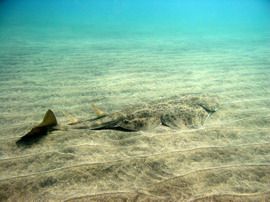
Just above the sand, you can see how the colouring aids camouflage
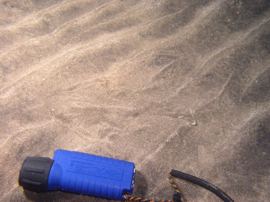
This baby shark was spotted at night and is only just longer than the torch
Face to face, can you see both the eyes and the breathing holes above the head?
In low light their camouflage helps them diffuse into the sand bottom
So please respect our angel sharks! If you find one covered in the sand - please leave it there as it may be digesting a meal or waiting for the next meal to come along. When diving with an angel shark it is a privilege granted by them, so respect their privacy, don't chase them excessively, and always give them an exit or plenty of space.
NO Deposit, Cancellation or Change fees!

